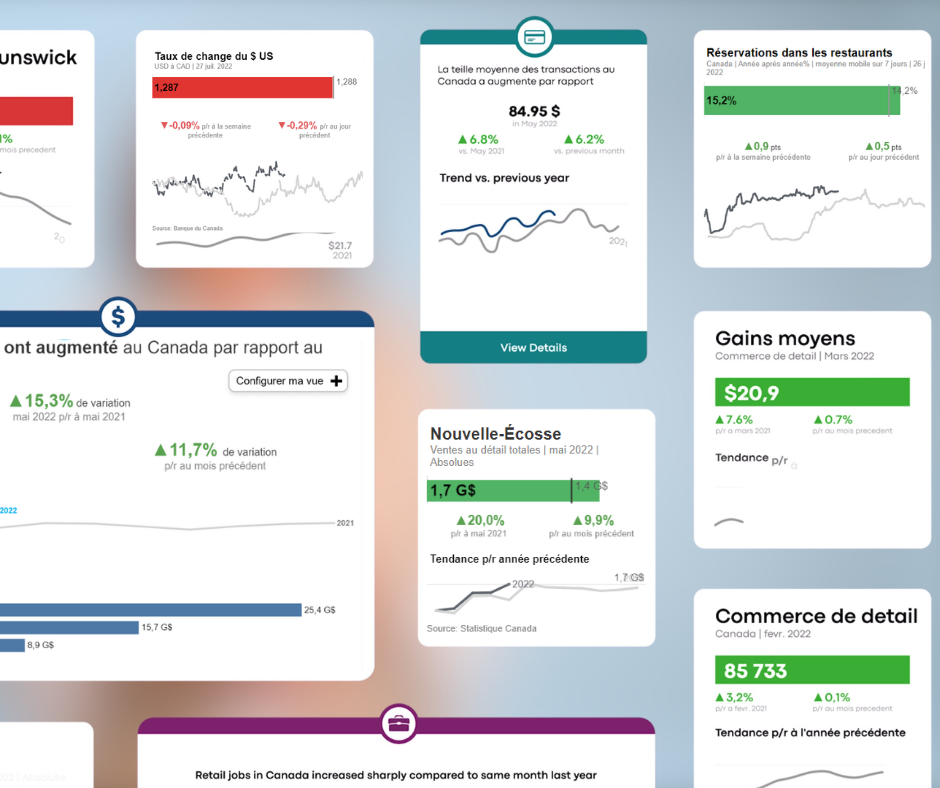Year-end message from our CEO
2022 was a year where the new skills of quickly adapting to changing market demands, perfected over the course of the pandemic, provided retailers with the confidence to forge through the year’s newest challenges and realize a stronger and economically viable retail sector.
We are proud to report that in 2022, as The Voice of Retail™ in Canada, RCC worked on over 80 different issues affecting the sector. Through the support of our wonderful members, and our strong relationships with Canada’s top policy decision makers, RCC continued to make significant positive impact in helping retailers of all sizes better manage their businesses.
We are delighted to share this overview on RCC’s key 2022 accomplishments on behalf of our members and the retail sector in Canada.
Thank you for your continued trust and membership in Retail Council of Canada. We look forward to working together in 2023 to ensure retail business and the people that work in them thrive.

Diane J. Brisebois
President and CEO
Retail Council of Canada
Advocacy

RCC’s strong advocacy work pays close attention to concerns that may add cost, affect reputation, establish precedent, and support the growth of Canada’s retail industry. This year we worked on over 80 retail sector-related issues.
Events

With a return to in-person events, forums, and conferences in 2022, RCC’s events team continued to deliver leading-edge content that helped the retail sector grow and prosper through the year and beyond.
Resources and Learning

RCC added several new resources and educational content in 2022 to assist members to better understand the ever-changing retail landscape in Canada. RCC also continues to support future retail leaders through our Retail Education Scholarship Program.
Committees

Our member-only committees and advisory councils allow participants to collaborate with industry peers through networking, idea sharing, establishing best practices, and helping shape policies that impact the retail sector.
Advocacy

Whether it is federally or regionally, our government relations team advocates for retail specific issues that impact the sector.
National

- On Tuesday, October 18, 2022, members of the RCC Board, RCC retail members, and RCC staff met key policymakers in Ottawa to speak on issues facing the retail sector.
- Those meetings featured Hon. Chrystia Freeland, Minister of Finance and Deputy Prime Minister; Hon. François-Philippe Champagne, Minister of Innovation, Science and Industry; Hon. Carla Qualtrough, Minister of Employment, Workforce Development and Disability Inclusion; and Hon. Marco Mendocino, Minister of Public Safety, Melissa Lantsman, MP, Conservative Deputy Leader, Alexandre Boulerice, MP, NDP Deputy Leader, and senior staff from the Prime Minister’s Office.
- RCC advocacy and general discussion topics included economic prospects, monetary policy, labour supply challenges, inflation, crime, and more.

- Helped minimize supply chain disruptions and potential food waste during the British Columbia flooding crisis and border blockades by working with government to open alternate transportation routes at the Canada / United States border and secure exemptions for products labelled for other markets.
- Helped members navigate and manage supply chain disruptions, including infant formula, pediatric pain relievers, eggs, and poultry products.
- Helped members manage major food safety investigations and recalls, including the outbreak of salmonella infections linked to kernel corn, by proactively liaising with government and other industry sectors.
- Helped keep costs down for members by working towards a reasonable increase (2.2%) in the farm-gate price of dairy for 2023
- Advocated to government to help make potential supply chain reporting legislation on forced labour meaningful and achievable for members, including providing testimony before the Senate and collaborating with other industry associations.
- Helped members comply with complex legal surveys under the Canadian Environmental Protection Act on chemicals found in consumer products by developing exclusive members-only webinars.
- Called on government to add an affordability and inflation lens to its consultation on the renewal of Canada’s tariff preference programs for developing countries to help keep costs down for retailers.
- Secured significant changes to new front-of-package nutrition labelling regulations – including Health Canada’s use of RCC’s magnifying glass icon.
- Provided member learning and engagement opportunities on animal welfare issues, with both producers and animal welfare organizations, and supported the ongoing work of the National Farm Animal Care Council, a critical organization that advances farm animal welfare in Canada through broad stakeholder collaboration.
- Implemented pilot project on transportation of dangerous goods, allowing for participating members to apply for temporary certificates to streamline the process for the transportation of small quantities of products such as chemical cleaning products, automotive products, and certain cosmetics, helping ease operational complexities and last-mile delivery.
- Facilitated member compliance with food and product safety regulations through regular discussions with government and other industry partners.
- Participated in the review of Canada’s Cannabis Act, urging for a continuous review process and advocating for a regulatory path forward for non-prescription health products containing CBD.
Throughout 2022, RCC continued to develop online resources, expertise, and advocacy efforts based on the following three areas of sustainability:

- Extended producer responsibility (EPR) – Given the range of materials retailers and quick service restaurants supply into the market, including packaging and paper, electronics, tires, hazardous products and more, there is an increasing amount of end-of-life management regulatory obligations. Therefore, as programs begin to transition to full producer responsibility across the country, RCC has been actively engaged in advocacy, government consultations, and more to support members. Key wins include improved harmonization of regulatory definitions across provinces and phased-in timelines where programs are transitioning to full EPR.
- Plastics – RCC engaged with municipal, provincial, and federal governments to ensure retail’s voice was heard when discussing and implementing single-use plastic bans for items including bags, utensils, food service ware, and more. RCC was heavily involved in the federal government’s consultation and release of the Single-use Plastics Prohibition Regulations where we were successful in ensuring an adequate timeline of 18 months to 2 years for regulatory implementation. RCC also advocated on behalf of members during regulatory consultations related to recycled content minimum requirements, recyclability and composability labelling, and a federal plastics registry. As a founding partner of the Canada Plastics Pact, RCC also continues to take part in discussions with the broader plastics value chain.
- Environmental, Social and Governance (ESG) Reporting and Climate Action – In 2022, RCC broadened its sustainability efforts to include ESG reporting and climate action. This has led to the development of new partnerships, including KPMG as a knowledge partner, while strengthening relationships with government, including Environment and Climate Change Canada, Transport Canada, and Natural Resources Canada. RCC has also hosted numerous information sessions and webinars to support members with sustainability reporting, monitoring/tracking emissions across in-store operations, supply chains, etc. RCC also developed a new grants and incentives webpage to help members identify federal and provincial opportunities to help finance the net zero transition through energy efficiency and zero emission vehicle incentives.
Provincial

- RCC was the only business association regularly talking to provincial governments about producer responsibility and its costs and impacts. RCC worked extensively behind the scenes to inform and impact upcoming amendments to the Recycling Regulation. That advocacy has included to how producers are defined for extended producer responsibility, return to retail collection and impacts, and upcoming obligation of new materials including mattresses, propane cannisters, commercial packaging and paper products, as well as more electronic, electrical and battery products. The next amendment to the Recycling Regulation is expected in early 2023.
- Government passed amendments to the Workers Compensation Act in fall 2022. RCC worked with a large coalition of business groups to oppose the amendments. These changes would result in substantial across-the-board increases to assessment rates (against a backdrop of concern about inflation and affordability). RCC will continue to work with other business and trade associations to ensure government and media hears our concerns.
- B.C. introduced a new Online Marketplace Sales Tax on July 1, 2022. RCC’s view is that this most significantly negatively impacts small retailers (which is contrary to the Government’s view) and can result in goods being subject to the B.C. Provincial Sales Tax twice. RCC convinced the Legislature’s Finance Committee to recommend the change be reviewed in the coming year to avoid any duplicate taxation.
- Some grocery stores are being fined in relation to Recycling Regulation requirements for mandatory return-to-retail of beverage containers. RCC has worked extensively with the Ministry of Environment and Climate Change Strategy staff to ensure they are aware of operational difficulties related to return-to-retail, and with Encorp Pacific to resolve various collection issues. RCC is also pushing Encorp Pacific to expand their own collection network to reduce pressure on grocers.
- The City of Victoria introduced what will likely be a precedent-setting single-use item bylaw on December 8, 2022. While other trade associations generally took a stance opposed to the bylaw, RCC has worked to improve it. Our efforts focused on costs, operational impacts, and the implementation timeline. RCC is generally pleased with the impact we were able to have on the bylaw: our view is the bylaw will have significantly less impact on food businesses, primarily grocers and quick-service restaurants, than had we not engaged significantly with City of Victoria staff.
- In 2022, B.C. released a first consultation paper on potential Consumer Protection legislation. RCC was the only major business association to respond. The changes outlined in the paper would have significant impacts on eCommerce, goods delivered after purchase, receipting requirements, and potentially shelf label requirements

- RCC lead efforts to address retail security issues that have achieved the collaboration of government, crown, and police to create strategic action plans and Round Tables in Alberta and Manitoba.
- Drove the elimination of complex red tape barriers related to scheduling Manitoba store employees on Sundays.
- Lead a comprehensive Alberta labour market study that better identified issues and solutions to address retail recruitment and retention issues in a post COVID-19 environment.
- RCC appointed the Chair of Multi-Material Stewardship Manitoba and industry’s voice on Alberta’s environmental oversight agency, ensuring our member’s voice is well positioned on provincial sustainability matters.

- RCC advocacy led to major revisions to the Blue Box regulation. This included a rework of the curbside collection rules creation process, an exemption for flexible and rigid plastic packaging-like products used for food protection (e.g., cling wrap and sandwich bags only need to pay for the package, not the bag itself) and a streamlined definition of marketplace.
- RCC continues to work actively on Blue Box reductions. This included Resource Productivity and Recovery Authority (RPRA) producing a front-facing statement that packaging stemming from restaurant or food court food consumed onsite can be deducted from submissions.
- RCC has also continued to support a diverse set of environmental reporting issues for members, as more stewardship files transition to individual producer responsibility, including lighting. Further, RCC has been actively involved in the batteries recycling file, working closely with Call2Recycle and RPRA to ensure system compliance.
- Over the past year, RCC has been integrally involved in working with government, the Ontario Energy Board (OEB) and local distribution companies to support a pathway to a new way of pricing electricity for member’s stores.
- In April 2022, RCC convinced the Minister’s Office that implementing more dynamic forms of energy pricing would lead to lower system cost and lower grid load during price peaks. From there, RCC has worked closely with local distribution companies to ensure the views of retailers are included as new rate class models advance, including partnering with Hydro One, Toronto Hydro, Ottawa Hydro, and Enova Power to pilot models with the OEB.
- RCC continues to advocate on the alcohol file. Some minor movement has occurred, including licensed grocery stores can now offer curbside pickup of beer, wine and cider, can cross-promote beer, cider and wine with non-alcohol products (some exceptions, like energy drinks), and have extended hours of retail sale, now permanently from 7am to 11pm. This file continues to be of increased importance as Ontario heads into more detailed conversation around modernizing the alcohol system.

- Bottle deposit system: RCC was actively involved and provided strong leadership in the implementation of the new expanded bottle deposit system whose regulations were adopted this summer. RCC obtained additional time for implementation in the final version of the regulation, in addition to allowing retailers to play an active role through the establishment of a transition committee composed of half retailers and half producers, even though this is a program that falls under the exclusive responsibility of producers.
- French language and Bill 96: RCC has been closely monitoring recent amendments to the French Language Act. Noting several inaccuracies and difficulties in application, we established a direct line of communication with the l’Office québécois de la langue française (OQLF) to share our comments and recommendations on the application of the law. A working committee has been set up with our members.
- Protection of personal Information and Bill 64: Listening to the call of the Ministry of Cybersecurity and Digital of Quebec, RCC has been actively working to ensure the regulations resulting from the adoption of Bill 64 (protection of personal information) are harmonized with those of the rest of the country. We also requested that draft regulations set to come into force in September 2023 be published in spring 2023, or earlier to give retailers more time to prepare and provide feedback. RCC also submitted detailed comments on the draft privacy incident regulation, which came into force in the fall of 2022.
- Food – June 13th Event: On June 13, 2022, in collaboration with the Conseil de la transformation alimentaire du Québec (CTAQ), RCC brought together nearly 150 stakeholders and experts in the field of food, as well as from the governments of Quebec and Canada, to discuss environmental issues best practices. The event was well attended and attracted lots of media attention.

- Protected the interests of RCC members during ongoing consultations with governments as the Atlantic region transitioned from COVID-19 lockdowns to re-openings.
- Worked as a liaison between RCC members, emergency measures organizations, senior government officials, the Salvation Army, and the Red Cross to provide support to those in need – across all Atlantic provinces – following the devastation created by Hurricane Fiona.
- Currently working with RCC members, government officials and interested stakeholders as three of the four Atlantic provinces engage in consultations regarding an extended producer responsibility model for packaging and printed paper.
- Consulted with each Atlantic province following the announcement of special, multi-step increases to the minimum wage in three of the four Atlantic provinces. RCC’s efforts succeeded in protecting the reputation of RCC members while ensuring predictability and transparency for future minimum wage increases through each province’s commitment to return to using a formula for setting the base wage.
New Brunswick:
- Presently serving as a Board Member with Encorp Atlantic as the Board transitions to not-for-profit status.
- Continuing to work with Encorp Atlantic Board members and a vast group of stakeholders to transform the Beverage Container Act and create a merged, extended producer responsibility model for alcohol and non-alcohol beverage container recycling in the province.
Nova Scotia:
- Working with government officials on loosening restrictions to allow the sale of beer, wine and ready-to-drink alcohol beverages in retail stores.
- Worked with stakeholders and managed different RCC member viewpoints regarding commercial tax changes for Halifax Regional Municipality.
PEI:
- Worked with all government and opposition MLAs – on two separate occasions – to advocate against a push for most PEI workers to be guaranteed an annual allotment of ten paid sick days.
- Advocating for the interests of RCC members as the province continues an extensive review its Employment Standards Act.
- Succeeded in having the Plastic Bag Reduction Act amended to remove the mandatory fee associated with providing a customer with a paper bag.
Newfoundland and Labrador:
- Worked with RCC members to assist in their preparations for the sugar sweetened beverage tax; consulted with government on a customer awareness campaign regarding the tax; engaged with media regarding the ongoing problems with the tax.
- Worked as a liaison between milk processors and the Dairy Farmers of Newfoundland and Labrador to delay the implementation of a regulation that will further limit the importation of fluid milk / specialty products like lactose free milk into the province.
To stay up to date on all of our advocacy activities, please visit our Advocacy page.
2022 Events

See how RCC brought retailers and visionaries together in 2022.

- RCC’s STORE Conference returned to the Canadian retail world as an in-person event on May 31st and June 1, 2022 for the first time since 2019. Over those two days we had more than 60 renowned retail executives grace our stage including Susan O’Brian, Eric Morris, Joanna Griffiths, Ron Wilson, Andrea Limbardi, Clint Mahlman, Gillian Stein, Kate Ancketill and others. The in-person format allowed for retailers to have meaningful interactions with over 60 of our exhibitors and sponsors.
- RCC STORE 23 returns in-person to Toronto on May 30 and May 31, 2023.

2022 began with virtual events and we were able to transition midway through the year to in-person affairs.
RCC hosted four half-day virtual forums and two full-day in-person conferences that focused on the most pressing matters affecting our members in different areas of retail. These included:
- Retail Human Resources Forum
- Retail Loss Prevention Forum (Retail Secure)
- Retail Cannabis Forum
- Retail Holiday Shopping Forum
- Retail Marketing Conference
- Retail West Conference

Our “In Conversation with Retail Leaders” series gives our associate members the opportunity to hear directly from leading retail executives across the country as they share their plans, best practices and industry knowledge. This year we hosted four conversations including:
- Carmen Fortino, Ontario Division Head of Metro Inc.
- Clint Mahlman, President and COO of London Drugs
- TJ Flood, President of Canadian Tire Retail
- Paul Wood, (former) President and CEO of Giant Tiger
- RCC hosted over twenty-one webinars in 2022 that covered topics including mental health in the workplace, economic impact of inflation and war, credit card surcharging, peak season hiring, introduction to ESG, and RCC’s ever-popular Retail Conditions Quarterly Report.
- RCC also continued to facilitate member townhalls until May of 2022, where we talked with experts about the latest updates on government and industry-related policies and programs, regional information, and suggested best practices for retailers. These sessions were a great resource of up-to-date retail relevant information during the continued changes brought on by COVID-19.

An important part of RCC’s mission is recognizing the outstanding retail accomplishments of individuals and retail teams. In 2022, we celebrated the best in retail through in-person events:
- Canadian Grand Prix New Product Awards on June 1, 2022, presented 40 highly deserving awards from an outstanding 121 submissions.
- This year’s Excellence in Retail Awards recognized 15 amazing winners, from a talented group of 54 finalists. We also had the honor of recognizing incredible individuals in the industry including Paul Wood, President and CEO of Giant Tiger with the 2022 Distinguished Canadian Retailer of the Year award, and Shashi Behl, Founder and CEO of Joydrop with the Independent Retail Ambassador of the Year award.
- In 2023 we are thrilled to be focussing on a roster of in-person events and look forward to welcoming everyone back to RCC STORE 23 conference in Toronto on May 30 to May 31, 2023.
To stay up to date with our 2023 lineup of events and webinars, visit our Events page. For sponsorship and exhibiting inquires, contact rccsponsorship@retailcouncil.org.
Resources and Learning

See what resources and tools we implemented in 2022 and how we support the retail industry.

- Working with partners such as KPMG, Moneris, Statistics Canada and Environics Analytics, we developed the first-ever, one-stop resource for Canadian retail data. The RCC Retail Pulse Dashboard updates automatically as soon as the most recent figures are available. Information is available on Retail Sales, Retail Jobs, Consumer Spending, Consumer Behaviour, and Economy.
- Together with Caddle, RCC also developed eight reports for retailers on how consumers were intending to shop in 2022, including information on: Easter, Mother’s Day, Victoria Day, Father’s Day, Canada Day, Back to School and Halloween.
- For the 5th year, we further expanded on the RCC X Leger Holiday Shopping Survey, the largest study of its kind, reaching out to over 2,500 Canadians from coast to coast about their end of year holiday shopping intensions. Advanced analytics were also added this year to further explore the findings. Five distinct holiday shopping consumers were identified – a tool retailers can work with as they continue to evaluate their 2022 holiday shopping successes and fine-tune their holiday shopping strategies for 2023.
- Thanks to the generous support of the Government of Ontario’s Ministry for Seniors and Accessibility, RCC was able to produce two amazing guidebooks: Accessibility Amid a Changing Retail Landscape and Mental Health in Retail. These free-to-download guides offers critical information and insights to help retail employees better understand accessibility and mental health and the impacts of both on their customers and business success.
Retail Education Scholarship Program
- RCC is proud to support students in their desire to work in the sector and make them aware of how dynamic a career in retail can be. In 2022, we awarded 14, $1,000 scholarship to Canadian students who are interested in making retail their career through our Retail Education Scholarship Program.
Certification Programs
- In 2022, over 9,000 retail employees have completed one of our certification programs
Click here for more information on our Certification Programs.
Committees

Throughout 2022, our member-led committees continued to meet with purposeful intention, working to address key issues in the retail sector. Here’s a summary of some of the more important work we did together this year.

- Held bi-weekly meetings to ensure members were aware of policy proposals and regulatory obligations related to recycling and extended producer responsibility (EPR) programs for a range of materials including electronics, tires, batteries, packaging and paper, hazardous and special products, and more.
- Regularly hosted guest speakers from provincial governments and producer responsibility organizations (PROs) to provide members with opportunities for questions and direct engagement on regulatory developments and market trends/issues.
- Worked with members to prepare policy positions and submissions in response to government consultations.
- Continued to develop and manage online resources to support members including:
Plastics Committee
- As part of RCC’s monthly meetings, various guest speakers were brought in to ensure members had an opportunity to engage directly with the federal government, waste management industry, Canada Plastics Pact, consultants and others on single-use plastics, recyclability of materials, recycled content standards, material alternatives and industry best practices.
- Worked with members to prepare policy positions and submissions in response to government consultations.
- Advocated government on behalf of members and supported with the tracking of municipal, provincial, and federal single-use plastic bans (bags, straws, food service ware, utensils, etc.) through committee meetings and online resources via RCC’s Sustainability Hub. These resources include:
ESG & Climate Action Committee
- In 2022, RCC launched a new ESG & Climate Action Committee and secured KPMG as a knowledge partner.
- Meetings are held bi-monthly with the following focus areas: government policy/incentives, scope 3 supply chain management, and environment, social and governance (ESG) / greenhouse gas (GHG) emissions reporting.
- As part of this committee, RCC has also launched a member-led Climate Risks & Opportunities Working Group and hosted various information sessions with guest speakers.
- RCC also developed the following tools and resources to help members with emerging ESG reporting requirements and identify federal and provincial opportunities to help finance the net-zero transition through energy efficiency and zero emission vehicle incentives. These resources include:
For more information on this committee, visit our Sustainability page.

Privacy
- Federal Privacy: Successfully called for re-introduction of federal privacy legislation in spring 2022 by arranging for RCC to co-sign an op-ed in The Hill Times. Bill C-27 came out in June 2022 just before summer recess. Although the bill needs amendments to better suit retail, it represents a re-activation of federal privacy reform and therefore a step forward toward to reducing national fragmentation among privacy regimes and maintaining Canada’s GDPR adequacy.
- Draft submission for federal Bill C-27 in progress.
- Federal Cyber Security: Submitted comments to federal Cyber Security strategy consultations calling for retail-specific training resources compliant with existing laws so that retailers can more effectively train and keep cybersecurity staff.
- Quebec Privacy: With Quebec team, sent in comments on new privacy amendments in Bill 64, chapter C 25 urging harmonization and interoperability with federal privacy frameworks where possible, calling for draft regulations and guidance on changes coming into force in September 2023 to be released early enough (spring 2023) to give retailers time to adapt and to consult if needed, and provided detailed comments on draft confidentiality incident regulations that came into force September 2022.
- Working with RCC Privacy Committee and Quebec team to provide member support and value for 2023, when the bulk of the new privacy requirements in Bill 64 come into force.
- Hosted federal government officials from Canadian Radio-television and Telecommunications Commission (CRTC) who oversee Canada’s Anti-Spam Legislation (CASL) enforcement for Q&A and resource-sharing with RCC Privacy Committee.
- Worked with Ontario team to connect RCC’s Privacy Committee with Ontario government officials for a Q&A session on Ontario Employment Standards Act changes requiring written policies on electronic monitoring of employees.
- Hosted expert guest speakers to share information on federal Bill C-27 and Quebec Bill 64 with Privacy Committee.
For more information on this committee, visit our main Privacy and Digital Retail page.
Legal
- Re-started Legal Committee in collaboration with SVP Public Affairs and Membership.
- Legal Committee members engaged with information on credit card class action case as well as proposed and actual reforms to the federal Competition Act via guest speakers and government officials from the Competition Bureau.
- Engaged expert speaker on an appeal proceeding before the Tax Court of Canada on which RCC is committed to intervene that will impact how loyalty programs are treated. The primary issue is whether loyalty programs should be treated as being “coupons” (taxable and hence eligible for input tax credits) or “gift certificates” (tax exempt and therefore ineligible for tax credits). In a somewhat unusual twist, we expect most members will agree with the position of the Canada Revenue Agency (CRA) who supports the former, but TD Bank is advocating for the latter.

- Formed a national Loss Prevention Taskforce and invited police partners to participate in monthly discussions to address the objectives identified by the LP Advisory Committee.
- RCC facilitated advocacy meetings across the country to engage in discussion with government on the strategic objectives, including:
- RCC, in partnership with the Ontario Provincial Police and the Canadian Anti-Fraud Centre, collaborated on a Gift Card Awareness Campaign. RCC developed several in-store assets for retailers to use to raise awareness of gift card fraud, including posters, display holder cards, and stickers. This program was release during March 2022, Fraud Awareness Month.
- RCC partnered with EPIC Risk, RCC’s Loss Prevention Advisory Committee, and several training and HR representatives from member companies to create a de-escalation video intended for front-line workers and management that is released as part of 2022 Holiday Security resources.
- RCC partnered with Safe Work Manitoba to create a Retail Safety & Security Guide. The Guide provides information to help businesses make their businesses less vulnerable to crime, identify and select an appropriate response to address crime and approaches to preventing the most common and severe forms of crime.
- RCC applied for and has been awarded a grant from the Ontario provincial government for a project focused on preventing cybercrime through community collaboration. RCC is working with police partners, other associations, and retail members to ensure the timely delivery of project deliverables.
- In Manitoba, a new first-in-Canada incident reporting project has been launched called Project Safe Shop. This pilot is focused on facilitating better collaboration between retailers, police, and the courts by enabling the participants to leverage a common technology for submitting incidents and analyzing macro data to identify and convict the most prolific offenders. Over 100 retail storefronts are submitting data through the platform with over 600 incidents reported and over 60 repeat offenders identified.
For more information on this committee, visit our main Loss Prevention page.
You can learn about all our current committees and communities of interest here, and if you are interested in joining, please reach out to membership@retailcouncil.org


